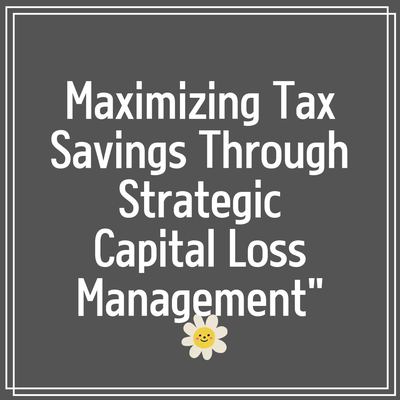
Understanding How Capital Losses Can Impact Your Taxes
Many investors may not realize the profound effect that
What are Capital Losses?
Capital losses occur when you sell an asset, such as stocks or bonds, for less than what you paid for it. In the context of taxation, these losses can offset capital gains, which are profits made from selling assets at a higher price than the purchase cost. For example, if you made a profit of $5,000 from selling one stock but lost $3,000 from another, your net capital gain would be just $2,
000, This principle is vital for reducing your overall tax liability.
The Tax Benefits of Reporting Capital Losses
Utilizing capital losses can significantly reduce taxable income. In the United States, taxpayers can use their capital losses to offset capital gains dollar for dollar. If your capital losses exceed your capital gains, you can use a portion of that excess to offset ordinary income as well. Currently, the IRS allows taxpayers to deduct up to
Carrying Over Losses
Should your capital losses surpass both your capital gains and the $3,000 deduction limit, you don’t lose those losses entirely. The IRS permits taxpayers to carry forward the unused portion of their capital losses to subsequent years. This carryover feature plays an integral role in long-term tax planning, as it allows individuals to apply the losses against future income or gains, thereby continuously reducing potential tax burdens.
Year-End Tax Strategies
As the calendar year comes to an end, investors often reassess their portfolios, seeking areas for improvement or reallocation of resources. This period can also offer an optimal window for
The Role of Tax Professionals
Navigating the nuances of capital gains and losses can be intricate, leading many investors to seek assistance from tax professionals. An experienced tax advisor can provide insights tailored to your unique financial situation. They can identify specific opportunities, advise on the best strategies to minimize tax liabilities, and ensure compliance with constantly evolving tax laws. Their expertise can be invaluable, especially for those with complex investment portfolios and various income sources.
Conclusion: Taking Control of Your Taxes
Capital losses represent an opportunity for taxpayers to gain control over their financial future. By strategically managing these losses, investors can reduce their tax obligations substantially and harness the full benefits of their investment activities. As markets fluctuate and individual portfolios experience both gains and losses, it’s crucial to remain informed and proactive. Understanding the intricacies of capital losses empowers you to make strategic decisions that can lead to more favorable tax outcomes. Whether you choose to navigate this journey independently or with the support of a tax professional, staying educated on such issues is pivotal for successful financial management.
